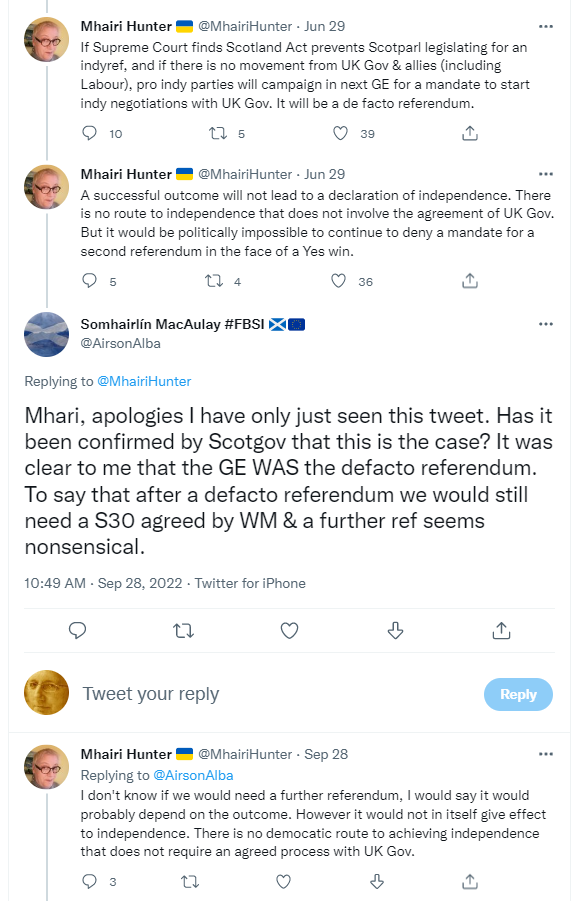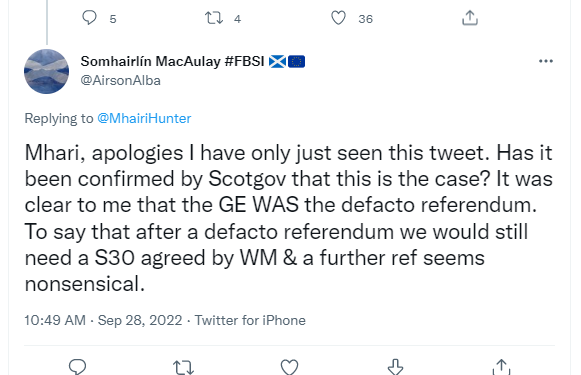A Scottish Independence referendum could radically alter the future of not just one entire nation, but several. In these circumstances, it is remarkable that there has been no media comment on the fact that the ruling party of Scotland had to radically re-argue the case for the referendum its own government had put before the London Supreme Court.
Let me make clear that I perfectly understand that, in seeking to refer the question of the Scottish Parliament’s competence to hold a referendum to the Supreme Court, the Scottish Government’s Lord Advocate was putting forward arguments both for and against. But in putting the arguments for, she omitted the most powerful and most obvious arguments.
That is simple fact.
The SNP has now had to intervene and supplement Bain’s pathetic unionist biased drivel with a proper brief (which the Supreme Court has accepted to hear) putting the genuine, powerful and internationally accepted legal arguments which Bain omitted.
That is simple fact too.
Please read my article of 30 July in which I described Bain as “spectacularly wrong”. I wrote:
The right to self-determination emerges again in Bain’s conclusion. Here she makes her view crystal clear, that self-determination is part of the “political context” and not a legal matter, it has no legal effect.
This explains why Bain nowhere mentions self-determination as a legal argument justifying Scotland’s right to hold a referendum.
I explained:
The Independence of a country is not a matter of domestic law it is a matter of international law. The right of the Scottish Parliament to declare Independence may not be restricted by UK domestic law or by purported limitations on the powers of the Scottish Parliament. The legal position is set out very clearly here:
5.5 Consistent with this general approach, international law has not treated the legality of
the act of secession under the internal law of the predecessor State as determining the effect
of that act on the international plane. In most cases of secession, of course, the predecessor
State‟s law will not have been complied with: that is true almost as a matter of definition.5.6 Nor is compliance with the law of the predecessor State a condition for the declaration
of independence to be recognised by third States, if other conditions for recognition are
fulfilled. The conditions do not include compliance with the internal legal requirements of
the predecessor State. Otherwise the international legality of a secession would be
predetermined by the very system of internal law called in question by the circumstances in
which the secession is occurring.5.7 For the same reason, the constitutional authority of the seceding entity to proclaim
independence within the predecessor State is not determinative as a matter of international
law. In most if not all cases, provincial or regional authorities will lack the constitutional
authority to secede. The act of secession is not thereby excluded. Moreover, representative
institutions may legitimately act, and seek to reflect the views of their constituents, beyond
the scope of already conferred power.That is a commendably concise and accurate description of the legal position. Of major relevance, it is the legal opinion of the Government of the United Kingdom, as submitted to the International Court of Justice in the Kosovo case. The International Court of Justice endorsed this view, so it is both established law and follows from the stated legal opinion of the British Government that the Scottish Government has the right to declare Independence without the agreement or permission of London and completely irrespective of the London Supreme Court.
The SNP brief argues, as Bain failed to argue, that:
The right to self-determination is a fundamental and inalienable right, among the most fundamental of all rights;
The SNP brief uses many of the same sources in its argument – the UN judgement, the UK submission to the International Court of Justice on Kosovo, the Supreme Court of Canada on Quebec – that I used in my article and have been using to argue the case here for the last ten years.
But this is important:
The SNP brief and Claire Mitchell KC are not using the same arguments and even the same sources that I used because they are following me, or because I am especially brilliant. The fact is that any experienced diplomat and any public international lawyer would know exactly the law, arguments and cases which apply. What Claire Mitchell has produced for the SNP is precisely what any decent lawyer or any good diplomat would produce to support the case for Scotland’s self-determination.
So why did Lord Advocate Dorothy Bain fail to produce it?
Well, there are several possibilities. Dorothy Bain could be a truly, spectacularly, ignorant, stupid and incompetent lawyer. Or, she could have been cleverly and deliberately failing the Scottish Government on whose behalf she was supposed to be acting, which would be an act of dreadful professional wrongdoing. Or she could have been asked by Sturgeon to present a case to the Supreme Court that was sure to fail.
I put those in ascending order of probability. There are no other possibilities.
Two questions inevitably arise. The first is this. The Lord Advocate is a political appointment. It is a ministerial position in Scotland. Why did Nicola Sturgeon appoint the unionist Dorothy Bain to the position? At the time of the appointment last year, it was already known that the certification of the Referendum Bill as legal would be a crucial task for the new Lord Advocate.
Why on earth not appoint a nationalist who would certify?
The answer is simple. Nicola Sturgeon is much more interested in identity politics than in Independence. Bain’s job is to see the justice system through these changes all of which are the highest priority on Sturgeon’s agenda:
1) Abolition of jury trials in sex assault cases
2) Establishment of misogyny as a hate crime and prosecution of sexist speech as a criminal offence
3) Reform of Gender Recognition Act
4) Abolition of “Not proven” verdict and conforming Scottish system to the English model
5) Continued clampdown prosecutions on “extremist” independence supporters and republicans, using breach of the peace, harassment, threatening communication, contempt etc etc.
Those are Bain’s tasks. That is the agenda for which Sturgeon selected her. Independence? Simply not on the radar.
The second question is how it happened that the SNP came to decide to put in an amicus brief to the Supreme Court to try to make up for Bain’s glaring omissions. Here there are reasons to be a little hopeful. Some worms are finally turning. Senior lawyers in the SNP were outraged at Bain’s fake attempt, and there was near open revolt among some Westminster MPs. At least 20 were outraged.
It is possibly not chance that the only senior SNP figure who put out the SNP’s brief to the public was Joanna Cherry. It is still her pinned tweet. This revolt caused angst in Casa Murell. For once Sturgeon was forced to give some ground.
The compromise agreed was that Sturgeon accepted that the SNP could submit a brief arguing from the universal right of self-determination, but Sturgeon only agreed on condition that it was made explicit the SNP was not arguing that Scotland could secede without Westminster’s permission. The SNP brief therefore contains this disclaimer:
2.3. The Intervener emphasises that it is not advocating for a direct exercise or implementation of the right to self-determination in these proceedings.
Notes the “emphasises”. This is really daft, because it contradicts the entire meaning of the Kosovo and Chagos judgments which it goes on to quote. Nicola Sturgeon’s position remains however that Scotland can only become independent with Westminster agreement.
Sturgeon’s representative on earth is her election agent, constituency minder and long term confidante Mhairi Hunter. She has recently spelt the position out very clearly indeed:

This gives an absolute and unequivocal veto to Westminster on Scottish independence. It reveals Sturgeon’s “plebiscitary election” as a total fraud.
It explains why Bain submitted her reference to the Supreme Court dismissing Scotland’s international right to self-determination as of no legal force, and why the SNP brief undermines all the sources it quotes by stating it is not making a case for the right to implement self-determination.
The British Establishment will never willingly surrender Scotland’s massive resources. Those who believe Westminster should have a veto, are against Independence, whatever lies they spout.
It really is as simple as that.
————————————————-
Forgive me for pointing out that my ability to provide this coverage is entirely dependent on your kind voluntary subscriptions which keep this blog going. This post is free for anybody to reproduce or republish, including in translation. You are still very welcome to read without subscribing.
Unlike our adversaries including the Integrity Initiative, the 77th Brigade, Bellingcat, the Atlantic Council and hundreds of other warmongering propaganda operations, this blog has no source of state, corporate or institutional finance whatsoever. It runs entirely on voluntary subscriptions from its readers – many of whom do not necessarily agree with the every article, but welcome the alternative voice, insider information and debate.
Subscriptions to keep this blog going are gratefully received.
Choose subscription amount from dropdown box:
Paypal address for one-off donations: [email protected]
Alternatively by bank transfer or standing order:
Account name
MURRAY CJ
Account number 3 2 1 5 0 9 6 2
Sort code 6 0 – 4 0 – 0 5
IBAN GB98NWBK60400532150962
BIC NWBKGB2L
Bank address Natwest, PO Box 414, 38 Strand, London, WC2H 5JB
Bitcoin: bc1q3sdm60rshynxtvfnkhhqjn83vk3e3nyw78cjx9
Ethereum/ERC-20: 0x764a6054783e86C321Cb8208442477d24834861a
Subscriptions are still preferred to donations as I can’t run the blog without some certainty of future income, but I understand why some people prefer not to commit to that.






